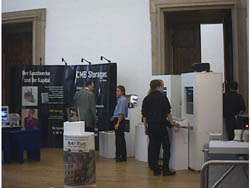
The same holds for medical treatment, job opportunities,
entertainment and even cultural activities.
In a program supported by the European comission, the
Filmzentrum Babelsberg - a large institution
dealing with movies - is working on the possibility to
download high quality films to any cinema or
even multipurpose community hall all over Europe. At
our recent event "Cultural Heritage in the
Global Village" we showed
high resolution panels that can transform virtual exhibitions to
educational centers like the one in Saalfelden shown
on the third slide.
Sallfelden is a prototypical case I and do not just say
that because we are currently in Salzburg.
The old Firebrigade Station was turned into an educational
center that combines all the community
libraries with adult education and different other activities
like cultural programs. The same
infrastructure of such a village center could be shared
by many tasks, it could be work during daytime and
culture in the evening. The increasing maturing of technology
makes the need for special
"telematic" centers obsolete. Rather we see an increasing
activity of transformation in "old"
Institutions like libraries and a convergence of previously
separated institutions towards
the shared use of digital facilities and digitized content.
Villages can thus really become "global villages", if
they are able to link wisely into
urban offers.